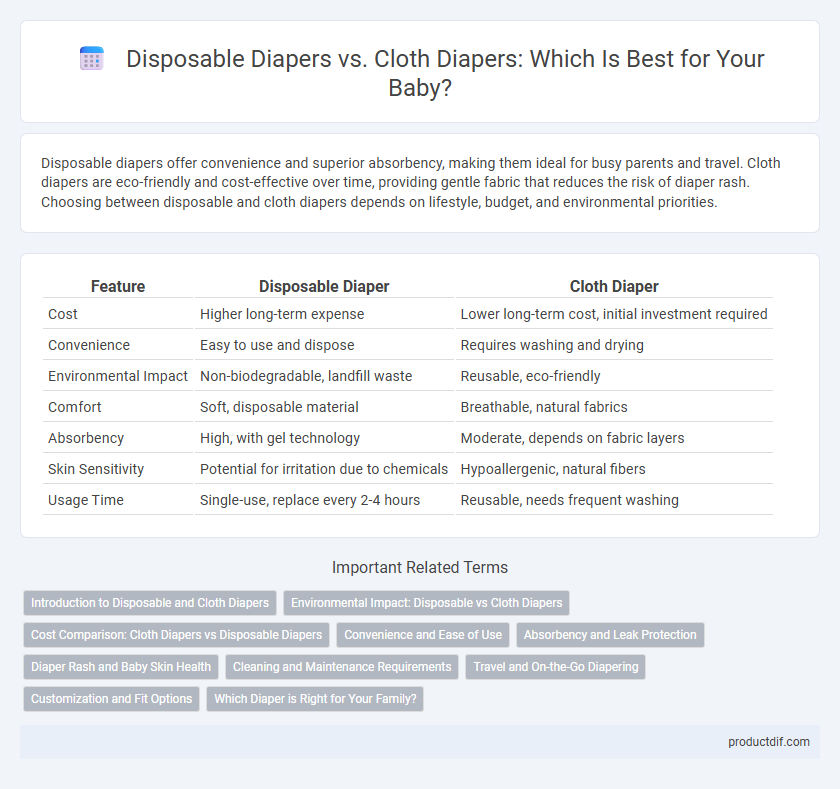Disposable diapers offer convenience and superior absorbency, making them ideal for busy parents and travel. Cloth diapers are eco-friendly and cost-effective over time, providing gentle fabric that reduces the risk of diaper rash. Choosing between disposable and cloth diapers depends on lifestyle, budget, and environmental priorities.
Table of Comparison
| Feature | Disposable Diaper | Cloth Diaper |
|---|---|---|
| Cost | Higher long-term expense | Lower long-term cost, initial investment required |
| Convenience | Easy to use and dispose | Requires washing and drying |
| Environmental Impact | Non-biodegradable, landfill waste | Reusable, eco-friendly |
| Comfort | Soft, disposable material | Breathable, natural fabrics |
| Absorbency | High, with gel technology | Moderate, depends on fabric layers |
| Skin Sensitivity | Potential for irritation due to chemicals | Hypoallergenic, natural fibers |
| Usage Time | Single-use, replace every 2-4 hours | Reusable, needs frequent washing |
Introduction to Disposable and Cloth Diapers
Disposable diapers feature superabsorbent polymers and waterproof outer layers designed for single-use convenience and effective moisture control. Cloth diapers are made from natural fibers like cotton or bamboo, offering reusability and breathability while requiring regular washing. Both types cater to different parenting needs regarding comfort, cost, and environmental impact.
Environmental Impact: Disposable vs Cloth Diapers
Disposable diapers contribute significantly to landfill waste, taking hundreds of years to decompose and releasing harmful chemicals during breakdown. Cloth diapers, made from natural fibers or sustainable materials, offer a reusable alternative that reduces waste and lowers overall environmental footprint. However, cloth diaper laundering requires water and energy, making efficient washing practices essential for minimizing environmental impact.
Cost Comparison: Cloth Diapers vs Disposable Diapers
Cloth diapers typically have a higher upfront cost due to the need for purchasing multiple reusable covers and inserts, but they significantly reduce long-term expenses since they can be washed and reused for up to three years. Disposable diapers cost around $70 to $80 per month for an average baby, resulting in an estimated $1,000 to $1,500 spent during the diapering period. Families looking for cost efficiency often prefer cloth diapers because their initial investment is balanced by lower ongoing costs and fewer environmental waste fees.
Convenience and Ease of Use
Disposable diapers offer unmatched convenience and ease of use due to their single-use design, eliminating the need for washing and drying, which saves significant time and effort for busy parents. Cloth diapers, while eco-friendly and cost-effective over time, require frequent laundering, folding, and proper sanitization, making them less practical for fast-paced lifestyles or travel. The simplicity of disposable diapers, combined with their quick disposal feature, makes them the preferred choice for parents prioritizing hassle-free diapering solutions.
Absorbency and Leak Protection
Disposable diapers offer superior absorbency with advanced gel technology that locks in moisture quickly, reducing the risk of leaks and keeping babies dry longer. Cloth diapers, while environmentally friendly, generally have lower absorbency and require additional layers or inserts to prevent leaks effectively. Parents prioritizing leak protection often choose disposables for convenience and consistent dryness during extended wear.
Diaper Rash and Baby Skin Health
Disposable diapers offer superior moisture-wicking properties that reduce the risk of diaper rash by keeping a baby's skin dry and minimizing prolonged exposure to irritants. Cloth diapers, while reusable and eco-friendly, require frequent changes and thorough washing to prevent bacterial buildup that can contribute to skin irritation and diaper rash. Choosing diapers with breathable fabrics and hypoallergenic materials significantly supports baby skin health by reducing friction and preventing inflammation.
Cleaning and Maintenance Requirements
Disposable diapers require minimal cleaning and maintenance as they are single-use and discarded after each change, whereas cloth diapers demand thorough washing, drying, and frequent sanitizing to prevent odor and bacteria buildup. Cloth diapers often need specialized detergents and diaper sprayers to remove stains and residue effectively, increasing the time and effort spent on maintenance. Proper cleaning routines and regular maintenance are essential for cloth diapers to ensure hygiene, while disposables offer a more convenient but less eco-friendly solution.
Travel and On-the-Go Diapering
Disposable diapers offer unmatched convenience for travel and on-the-go diapering due to their lightweight design and ease of disposal, eliminating the need for washing. Cloth diapers require carrying extra supplies such as wet bags and detergent, which can be cumbersome during trips but provide eco-friendly benefits and cost savings over time. Parents often prefer disposable options for short trips or air travel where laundry facilities are limited, while cloth diapers suit extended stays with access to washing amenities.
Customization and Fit Options
Disposable diapers offer a variety of sizes and adjustable tabs designed for quick, secure fits that accommodate active babies and different body shapes. Cloth diapers provide extensive customization with options like adjustable snaps, inserts, and stretchy fabrics, allowing parents to tailor absorbency and comfort to their baby's needs. Both diaper types prioritize fit to prevent leaks and maximize comfort, but cloth diapers excel in adaptability through interchangeable components.
Which Diaper is Right for Your Family?
Choosing between disposable diapers and cloth diapers depends on factors such as convenience, environmental impact, and budget. Disposable diapers offer ease of use and excellent leak protection, making them ideal for busy families or travel, while cloth diapers provide a sustainable and cost-effective alternative with reusable materials. Families seeking eco-friendly options may prefer cloth diapers, but those prioritizing time-saving solutions often favor disposables.
Disposable Diaper vs Cloth Diaper Infographic

 productdif.com
productdif.com